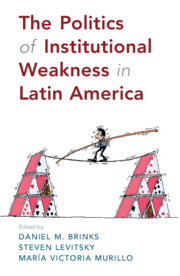Crossref Citations
This Book has been
cited by the following publications. This list is generated based on data provided by Crossref.
Rayo, Giorleny Altamirano
2021.
State Building, Ethnic Land Titling, and Transnational Organized Crime: The Case of Honduras.
Latin American Research Review,
Vol. 56,
Issue. 1,
p.
50.
Beck, Erin
and
Mohamed, Amir
2021.
A Body Speaks: State, Media, and Public Responses to Femicide in Guatemala.
Laws,
Vol. 10,
Issue. 3,
p.
73.
Brent Edwards Jr., D.
Caravaca, Alejandro
and
C. Moschetti, Mauro
2021.
Network governance and new philanthropy in Latin America and the Caribbean: reconfiguration of the State.
British Journal of Sociology of Education,
Vol. 42,
Issue. 8,
p.
1210.
Peeters, Rik
and
Dussauge Laguna, Mauricio I.
2021.
Acting out or playing along: A typology of citizens' low trust responses to public organizations.
Governance,
Vol. 34,
Issue. 4,
p.
965.
Cepik, Marco
2021.
Intelligence and Security Services in Brazil Reappraising Institutional Flaws and Political Dynamics.
The International Journal of Intelligence, Security, and Public Affairs,
Vol. 23,
Issue. 1,
p.
81.
Lotta, Gabriela
Pires, Roberto
Hill, Michael
and
Møller, Marie Ostergaard
2022.
Recontextualizing street‐level bureaucracy in the developing world.
Public Administration and Development,
Vol. 42,
Issue. 1,
p.
3.
Eaton, Kent
and
Schakel, Arjan H.
2022.
Interconnected multilevel governance: Regional governments in Europe and beyond.
Regional & Federal Studies,
Vol. 32,
Issue. 3,
p.
255.
2022.
The People's Hotel.
p.
73.
Garay, Candelaria
and
Simison, Emilia
2022.
When Mayors Deliver: Political Alignment and Well-being.
Studies in Comparative International Development,
Vol. 57,
Issue. 3,
p.
303.
Palma, Oscar
2022.
Global Security in Times of Covid-19.
p.
17.
2022.
The People's Hotel.
p.
19.
2022.
The People's Hotel.
p.
181.
Weyland, Kurt
2022.
Why US Democracy Trumps Populism: Comparative Lessons Reconsidered.
PS: Political Science & Politics,
Vol. 55,
Issue. 3,
p.
478.
2022.
The People's Hotel.
p.
227.
Holland, Alisha C.
2022.
A New Contract? The Joint Mobilization of Unionized and Contract Workers in Latin America.
Latin American Politics and Society,
Vol. 64,
Issue. 2,
p.
116.
Negretto, Gabriel L.
2022.
Tinkering with executive term limits: partisan imbalances and institutional legacies in Latin America.
Democratization,
Vol. 29,
Issue. 1,
p.
38.
2022.
The People's Hotel.
p.
1.
2022.
The People's Hotel.
p.
120.
2022.
The People's Hotel.
p.
47.
Olivier, Tomás
and
Berardo, Ramiro
2022.
Birds of a Feather Fight Together: Forum Involvement in a Weakly Institutionalized Ecology of Policy Games.
Policy Studies Journal,
Vol. 50,
Issue. 1,
p.
176.



